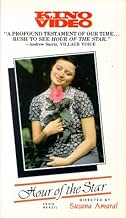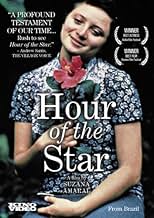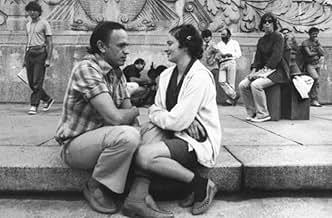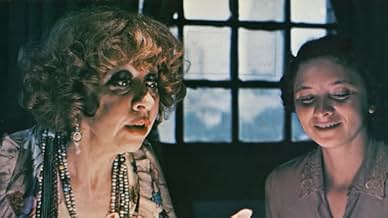IMDb RATING
7.4/10
1.8K
YOUR RATING
The tale of the naive Macabéa, a 19-year-old lonely and poor woman from the Northeast of Brazil who moves to São Paulo in hopes of a better future after losing the aunt who raised her.The tale of the naive Macabéa, a 19-year-old lonely and poor woman from the Northeast of Brazil who moves to São Paulo in hopes of a better future after losing the aunt who raised her.The tale of the naive Macabéa, a 19-year-old lonely and poor woman from the Northeast of Brazil who moves to São Paulo in hopes of a better future after losing the aunt who raised her.
- Director
- Writers
- Stars
- Awards
- 11 wins & 1 nomination total
Sonia Guedes
- Joana
- (as Sônia Guedes)
Dirce Militello
- Mãe de Glória
- (as Dirce Militelo)
Euricio Martins
- Guarda do Metrô
- (as Eurico Martins)
Lizete Negreiros
- Maria
- (as Lizette Negreiros)
- Director
- Writers
- All cast & crew
- Production, box office & more at IMDbPro
Featured reviews
If you've ever read Lispector's text, Amaral's film is a must-see. You may be wondering how Amaral could possibly manage to capture Lispector's musings on the act of writing or questions regarding representation as they are presented through her narrator, Rodrigo. Pay close attention, and you'll find your answer. Although Rodrigo is absent from the film, he is symbolically present via Amaral's juxtaposition of Macabea's humble life, and the reality that is presented to her within an industrialized society. I personally believe that this is not a representation of the original text, but an appropriation of certain underlying themes within it. As you will see, Amaral manages to give us her own perspective and cultural critique of representation via the artistic medium of which she is a part. In this sense, the film stands alone, independent of the novella, with a few strong threads tying the two together. For anyone who is interested in the question of representation within the cultural industry, commodity fetishism, capitalism, feminism, etc., you need to watch this film, and then you need to watch it again.
Clarice Lispector was one of the leading writers in the Portuguese language in the last century and Susana Amaral is one of the leading Brazilian film-makers in recent years, therefore the latter's intepretation of the former's tragically real novel could only be a success.... and doesn't disappoint.
Anti-heroine Macabea, like many migrants forced to flee their North-eastern birthplaces, towns such as Paraiba, has received little or no education, has no parents, and would have remained anonymous in a world too brutal for her type had not Lispector and Amaral been brave enough to bring her tragedy to the intention of the comparatively well off lucky people that we all are.
The film narrates events in poor Macabea's life - getting a job as a typist, getting a first boyfriend in fellow migrant Olympico, losing him to her more beautiful work colleague Gloria, before the tragically inevitable conclusion. Throughout the plot is punctuated with moments of revelation as the young lady finds escapism in film stars such as Marilyn Munroe, classical music, and the taste of Coca-cola. Her lack of education reveals her poor upbringing. Constantly as viewers we shout out 'don't eat whilst sitting on the toilet!' 'Don't wipe your nose on your shirt' 'Don't put so much sugar in your coffee!' Whilst her lack of common sense provides humour, it is also tragic. The viewers find themselves speaking to the characters, advising them. If only someone had been able to do when they were younger, then they might not be so hopeless in this dog-eat-dog world. This lack of knowledge is reflected in Olimpico, who aspires to be famous, suffers from the same disease as Macabea, that of being neglected by society. When Macabea asks him what culture is, he responds, 'Culture, culture.... culture is culture.' There is a world out there, the one we viewers all know and live in. This two characters were born to exist outside it.
In one of the most beautiful scenes of this poignant film, Macabea stares at her ugly reflection in the mirror with the camera placed behind her. She states, smiling, 'I'm a typist, a virgin, and I like coca-cola.' This is very little, yet to her represents an ephinany, a moment in her life which the camera cherises as much as she does. The tragically happy ending to the film evokes both the fundamental message of Lispector's dying voice (she wrote the novel fighting a losing battle against cancer) and Amaral's feminist vision. There is a responsibility in art, that social and moral conscience that Sartre spoke of. In Brazil 'there are thousands of girls like this' (as the back of Lispector's book tells). 'Few of them ever complain and as far as I know they never protest, for there is no one to listen'. As viewers, we are listening, seeing, feeling sorry for our victim of social conditions. Upon winning the Havana film festival director's award in 1976, Amaral quoted Lispector's wish that this 'stubborn race of dwarfs... would one day vindicate the right to protest'. This is a protest film, forcing middle class viewers to sympathise with the poverty stricken dwarfs we find it so easy to ignore. It is beautifully constructed to evoke sympathy, pity, and perhaps even lead us to take more social and moral responsibility on board, as Lispector and Amaral have done.
Anti-heroine Macabea, like many migrants forced to flee their North-eastern birthplaces, towns such as Paraiba, has received little or no education, has no parents, and would have remained anonymous in a world too brutal for her type had not Lispector and Amaral been brave enough to bring her tragedy to the intention of the comparatively well off lucky people that we all are.
The film narrates events in poor Macabea's life - getting a job as a typist, getting a first boyfriend in fellow migrant Olympico, losing him to her more beautiful work colleague Gloria, before the tragically inevitable conclusion. Throughout the plot is punctuated with moments of revelation as the young lady finds escapism in film stars such as Marilyn Munroe, classical music, and the taste of Coca-cola. Her lack of education reveals her poor upbringing. Constantly as viewers we shout out 'don't eat whilst sitting on the toilet!' 'Don't wipe your nose on your shirt' 'Don't put so much sugar in your coffee!' Whilst her lack of common sense provides humour, it is also tragic. The viewers find themselves speaking to the characters, advising them. If only someone had been able to do when they were younger, then they might not be so hopeless in this dog-eat-dog world. This lack of knowledge is reflected in Olimpico, who aspires to be famous, suffers from the same disease as Macabea, that of being neglected by society. When Macabea asks him what culture is, he responds, 'Culture, culture.... culture is culture.' There is a world out there, the one we viewers all know and live in. This two characters were born to exist outside it.
In one of the most beautiful scenes of this poignant film, Macabea stares at her ugly reflection in the mirror with the camera placed behind her. She states, smiling, 'I'm a typist, a virgin, and I like coca-cola.' This is very little, yet to her represents an ephinany, a moment in her life which the camera cherises as much as she does. The tragically happy ending to the film evokes both the fundamental message of Lispector's dying voice (she wrote the novel fighting a losing battle against cancer) and Amaral's feminist vision. There is a responsibility in art, that social and moral conscience that Sartre spoke of. In Brazil 'there are thousands of girls like this' (as the back of Lispector's book tells). 'Few of them ever complain and as far as I know they never protest, for there is no one to listen'. As viewers, we are listening, seeing, feeling sorry for our victim of social conditions. Upon winning the Havana film festival director's award in 1976, Amaral quoted Lispector's wish that this 'stubborn race of dwarfs... would one day vindicate the right to protest'. This is a protest film, forcing middle class viewers to sympathise with the poverty stricken dwarfs we find it so easy to ignore. It is beautifully constructed to evoke sympathy, pity, and perhaps even lead us to take more social and moral responsibility on board, as Lispector and Amaral have done.
This film was an excellent metaphor for the depravation so many northern Brazillians experience when they imigrate to the coast in search of work, love, opportunity, and excitement.
Macabea, the protagonist of the film, is an immigrant orphan from northern Brazil who comes to the city in search of economic prosperity. She lacks the education to find a descent job, the social skills to have friends or a boyfriend, and the etiquette in order to fit in in normal life.
She is portrayed as ugly, filthy, and disgusting. She lacks an understanding of proper hygiene, as shown several times throughout the movie when she does not wash her hands and, as a result, covers the papers she types in dirt and in a scene where she eats while urinating on a pot in the middle of the night.
She is a symbol of the depravation of so many northern and northeastern immigrants in Brazil.
The film is full of cleverly constructed imagery and symbolism. Depressing and sad, but genius.
Macabea, the protagonist of the film, is an immigrant orphan from northern Brazil who comes to the city in search of economic prosperity. She lacks the education to find a descent job, the social skills to have friends or a boyfriend, and the etiquette in order to fit in in normal life.
She is portrayed as ugly, filthy, and disgusting. She lacks an understanding of proper hygiene, as shown several times throughout the movie when she does not wash her hands and, as a result, covers the papers she types in dirt and in a scene where she eats while urinating on a pot in the middle of the night.
She is a symbol of the depravation of so many northern and northeastern immigrants in Brazil.
The film is full of cleverly constructed imagery and symbolism. Depressing and sad, but genius.
A depressing and well done film, very introspective, immersive, and psychological. Marcelia Cartaxo's work is quite impressive and she did deserve all the acknowledgement and prizes. Great José Dumont, Fernanda Montenegro as the fortuneteller, and Tamara Taxman also go very well in their supporting roles. Deceased in this very year 2020, Suzana Amaral might have directed more movies! Spectator does feel discomfort for the depreciated existance of the character Macabea. Therefore, the movie is very good and it is a skilful adaptation of a hard novel to transport to the screen. The single problem to be highlighted is not producers' fault, as it derives from the source: there is a disturbing prejudice by writer Clarice Lispector herself towards poor people who migrates from Northeast to São Paulo. It appears sharply in both narrow-minded ignorant macho sexism by Dumont's character Olímpico and, mainly, in Macabea's foolness and absolute lack of fitness, attractiveness, aspirations and even hygiene. It is not only an existentialist movie, but also a film about Brazilian culture, and that from the lens of a talented but also elitist novelist.
Unfortunately this is just good photography and decent acting. Nothing else you can see here... The dialogues are dull and the story takes you into a jorney to nowhere. It's just a waste of time.
Did you know
- TriviaBrazil's submission to the 1987's Oscar as Best Foreign Film. Suzana Amaral was the first Brazilian female director submitted. The next female director submitted would be Anna Muylaert for Une seconde mère (2015).
- ConnectionsFeatured in São Paulo - Sinfonia e Cacofonia (1994)
- SoundtracksCada Vez Que Ela Sai
(Música Incidental)
Written by Thibes
Performed by Ivan Prado
Details
Contribute to this page
Suggest an edit or add missing content












